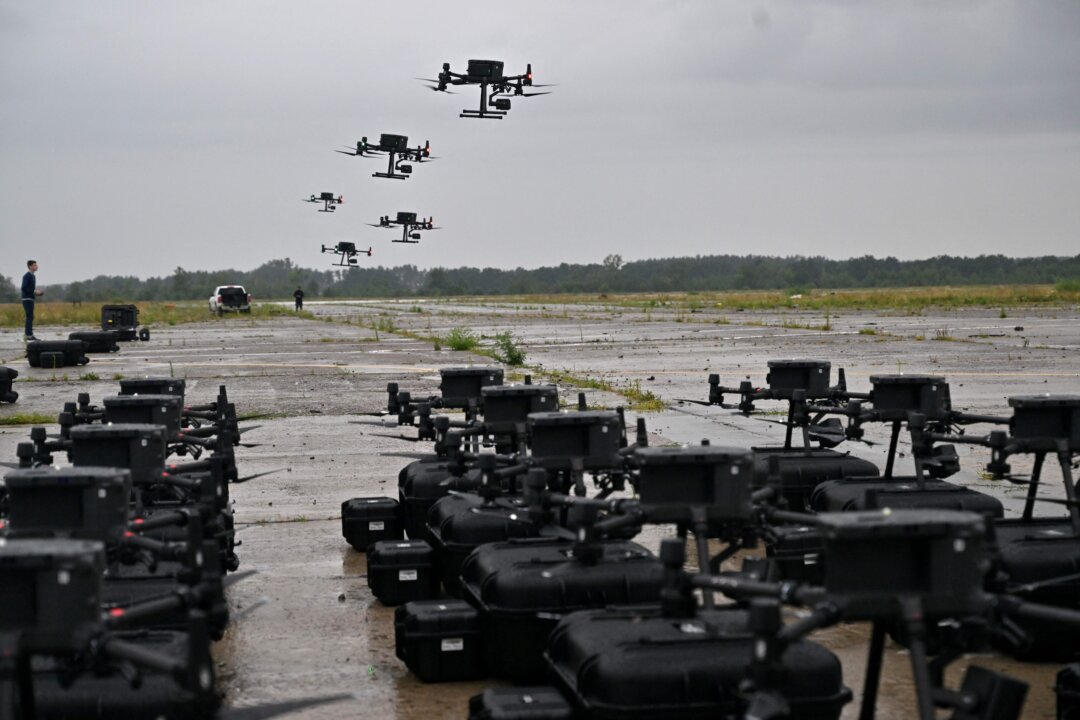Documents obtained by Reuters show that Russian-owned company Kupol has been mass producing military drones in Chinese factories.
The White House has expressed concern over Russia’s reported weapons program established in China to develop long-range attack drones for its war against Ukraine.
Reuters exclusively reported on Sept. 25 that IEMZ Kupol, a subsidiary of Russian state-owned arms company Almaz-Antey, has developed and flight-tested a new military drone in China with the help of Chinese experts.
The documents obtained by Reuters show that Kupol has been mass-producing military drones in Chinese factories to use in its war against Ukraine, according to the report.
The range of the drone, a Garpiya-3 (G3) model, is 1,200 miles, with a maximum payload of 110 pounds. The sample drone made in China has been sent to headquarters in Russia for further testing, according to the Reuters report.
The White House is concerned by the report, a spokesperson told Reuters.
“These transactions are further evidence that the PRC [People’s Republic of China] government’s efforts are clearly not meeting the mark,” a National Security Council (NSC) spokesperson said on Sept. 25.
The U.S. government hasn’t seen any evidence to suggest that the Chinese regime is directly involved in providing lethal weapons to Russia, or its awareness of the transactions, according to the spokesperson.
“However, the PRC government also has a responsibility to ensure its companies are not providing lethal assistance,” the spokesperson said.
The United States has accused China of providing substantial help to Russia for its war in Ukraine. NATO stated at its summit in Washington in July that China is “a decisive enabler” in Russia’s war effort and will pose the biggest challenge for NATO in the future.
Kupol, Almaz-Antey, and the Russian Defense Ministry didn’t respond to the Reuters report. The Chinese Foreign Ministry stated that it was not aware of such a project, noting that Beijing maintains a neutral stance on the Russia–Ukraine war.
Shen Ming Shih, director of the Division of National Security Research at Taiwan’s Institute for National Defense and Security Research, estimated that Russia uses more than 10,000 drones every month in its war in Ukraine.
“In addition to obtaining them from Iran, China is a major drone manufacturing country. It is indeed possible to produce them in China and transport them to Russia and the battlefield,” he told The Epoch Times on Sept. 26.
“China has been providing weapons, including drones, to Russia.”
For civilian drones, or if the drones are sold to other countries and then transferred to Russia, the United States can’t do much about it, according to Shen.
“But if China is found to be selling active military drones to Russia and they are used in the battlefield in Russian–Ukrainian war, the U.S. government must hold the Chinese regime accountable. The measures would include investigation and questioning by the United States at high-level meetings, sanctions on relevant companies … and economic sanctions.”
Su Tzu-yun, a researcher and director of Division of Defense Strategy and Resources at Taiwan’s Institute for National Defense and Security Research, said that instead of exporting attack drones to Russia, “China let Russia fund a shell company like this in China to do so-called R&D.”
“They actually make Chinese products appear to be made by Russian companies and quickly delivered to the Russian military and probably use a model similar to triangular trade to cover its arms exports to Russia,” Su told The Epoch Times on Sept. 26.
Shen said that the benefit of producing military drones in China is that “they don’t need to be modified in Russia or on the battlefield and can be directly put into combat.”
“On the one hand, China can also use this deal to obtain more Russian-made weapons and technology. China is preparing to purchase advanced helicopters from Russia, which may also become part of the deal,” he said.Both Su and Shen said it’s unlikely that China will get directly involved in the Russia–Ukraine war by sending troops to fight with the Russian military.
Shen said that at present, there is no evidence to suggest that the CCP has directly participated in the war.
“In order to ease relations with the United States, it is impossible for the CCP to openly, directly support Russia. Covert assistance is very possible,” he said.
“The possibility of assisting large-scale weapons systems is not high, but the CCP is providing Russia with spare parts, supplies, food, medicines, etc. that are related to logistics in large quantities.”
Shen expects the Chinese regime to continue to support Russia.
“The CCP may see Russia lose, but it will not let it collapse. The CCP will take action only at critical moments and at Putin’s request. China also needs Russia to balance the United States and NATO countries in the Indo-Pacific,” he said.
Su expects the CCP–Russia alliance to remain intact because of the geopolitical convenience, including that they “share economic and technological needs, as well as energy and material exchange.”
“So they’ve formed the new Iron Curtain. But geopolitically, they are in a position where they are relatively easy to be surrounded, so in the long run, the situation is relatively unfavorable to them,” Su said.
Luo Ya and Reuters contributed to this report.

